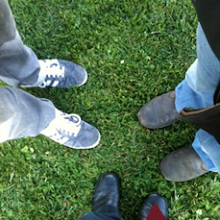Mole (animal)
Mmammals in the family Talpidae,
called true moles.
For other uses, see Mole (disambiguation).
Moles are the majority of the members of themammal family Talpidae
in the order Soricomorpha.
each hand has an extra thumb
(also known as a prepollex)
next to the regular thumb.
Although moles burrow, some species are semi-aquatic.
Moles have cylindrical bodies covered in fur;
the ears are generally not visible.
They have small or covered eyes
and can probably still tell night from day,
although they are otherwise blind.
Moles eat small invertebrates living underground.
the mole is (mouldywarp),
German (Maulwürfe)
Norwegian,Icelandic (muldvarp),
the muld part of the word means soil
and the varp part is old-Nordic throw),
hence:
Diet
A mole's diet primarily consists of earthworms and other small invertebrates found in the soil and also a variety of nuts. Because their saliva contains a toxin that can paralyze earthworms, moles are able to store their still living prey for later consumption. They construct special underground "larders" for just this purpose—researchers have discovered such larders with over a thousand earthworms in them.
Although the mole can be eaten, the taste is said to be deeply unpleasant.
| Moles | |
|---|---|
| Scientific classification | |
| Kingdom: | Animalia |
| Phylum: | Chordata |
| Class: | Mammalia |
| Infraclass: | Eutheria |
| Order: | Soricomorpha |
| Family: | Talpidae in part |
in the order Soricomorpha.
Extra thumb
Moles have polydactyl hands;each hand has an extra thumb
(also known as a prepollex)
next to the regular thumb.
Although moles burrow, some species are semi-aquatic.
Moles have cylindrical bodies covered in fur;
the ears are generally not visible.
They have small or covered eyes
and can probably still tell night from day,
although they are otherwise blind.
Moles eat small invertebrates living underground.
Moles can be found in most parts of
North America, Asia, and Europe,
although there are no moles in Ireland.Terminology
In Early Modern English,the mole is (mouldywarp),
German (Maulwürfe)
Norwegian,Icelandic (muldvarp),
the muld part of the word means soil
and the varp part is old-Nordic throw),
hence:
"one who throws soil" or "dirt tosser".
Male moles are called boars,
females are called sows.
Diet
A mole's diet primarily consists of earthworms and other small invertebrates found in the soil and also a variety of nuts. Because their saliva contains a toxin that can paralyze earthworms, moles are able to store their still living prey for later consumption. They construct special underground "larders" for just this purpose—researchers have discovered such larders with over a thousand earthworms in them.
...eeew, gross and more ewww below:
Before eating earthworms, moles pull them between their squeezed paws to force the collected earth and dirt out of the worm's gut.Although the mole can be eaten, the taste is said to be deeply unpleasant.

No comments:
Post a Comment